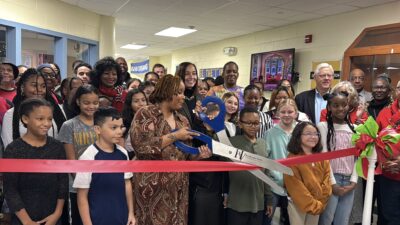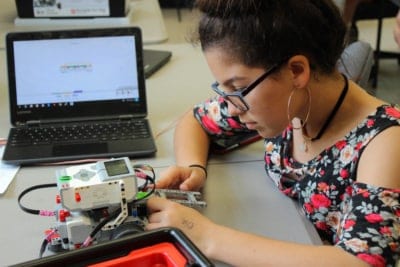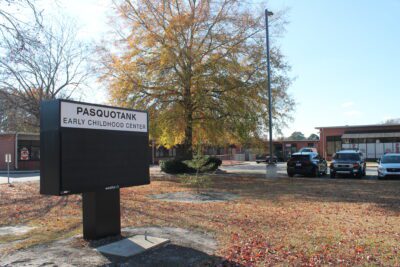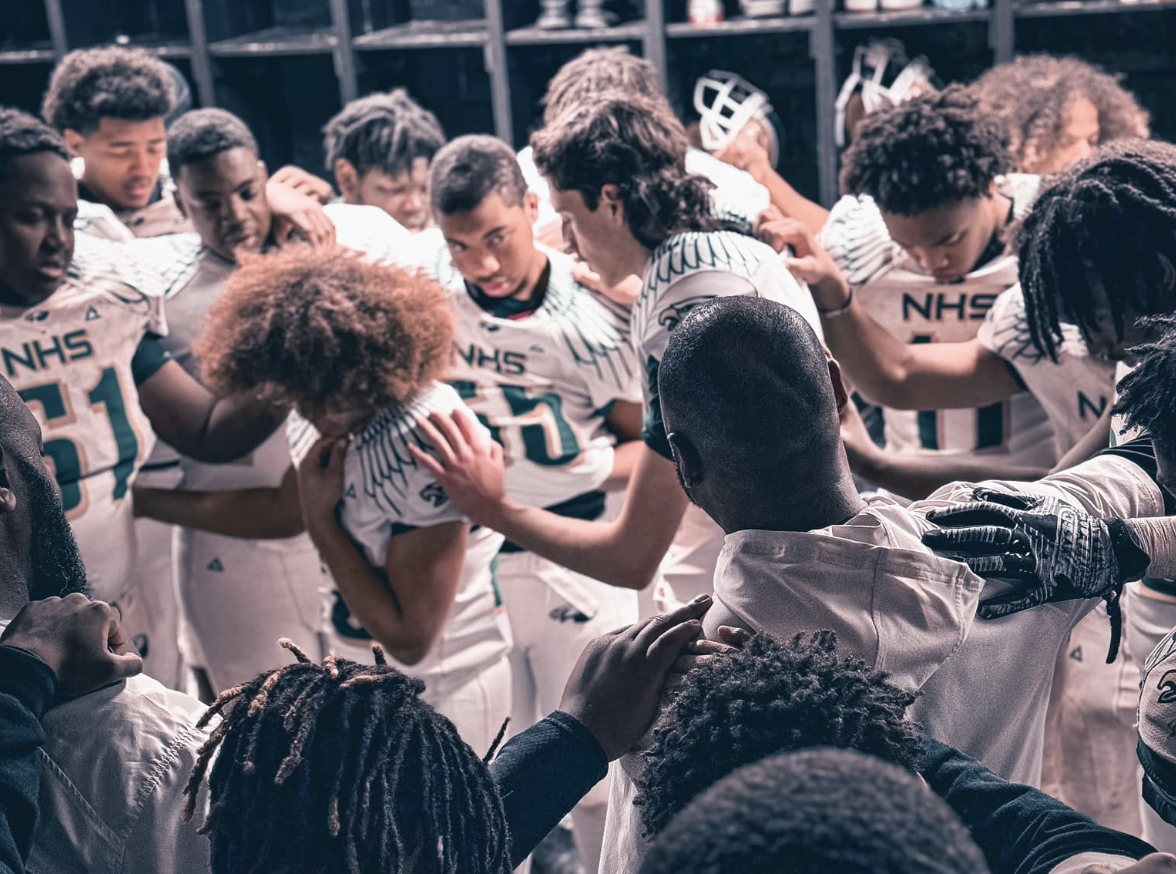
Droves of fans showed up to Northeastern High School in Elizabeth City last week for their football game against Vance County High School. The Friday night lights were shining brightly as the crowd excitedly watched the game happening down on the field.
It’s not an uncommon scene at Northeastern, where the highly ranked football team is used to drawing a large crowd. This game was different, though. For this game, the crowd showed up to witness two Full-Service Community Schools (FSCS) play one another.
Research suggests that high school students who participate in athletics experience sustainable positive outcomes. Some high school students participating in athletics see improvements on their GPA scores, according to this study. Other research has shown that participation in high school football can be especially beneficial for the mental well-being of at-risk youth.
Northeastern has seen this happen for its own students. Having a strong football team has positively impacted both their school’s culture and students’ lives. Now as a community school, they have the material support they need to maximize their school’s potential.
![]() Sign up for the EdDaily to start each weekday with the top education news.
Sign up for the EdDaily to start each weekday with the top education news.
In sports terms, football sets up the play and being a community school gives them the resources they need to successfully execute that play.
The Northeastern Eagles claimed victory last Friday over the Vance County Vipers in a 40-8 win. Ranked 4th out of 25 in their division to Vance County’s ranking of 20th out of 25, the win was somewhat expected. Northeastern continues the season with a 4-1 record.
Full-Service Community Schools
FSCS’s focus on more than academics, according to EdNC’s previous reporting. They have four pillars of support focused on collaborative leadership, integrated student support, expanded and enriched learning opportunities, and family and community engagement.
At Northeastern, the community school coordinator is no stranger to their community. In fact, it’s the community that raised him. Antonio Moore is both the high school football coach and community school coordinator at the high school.
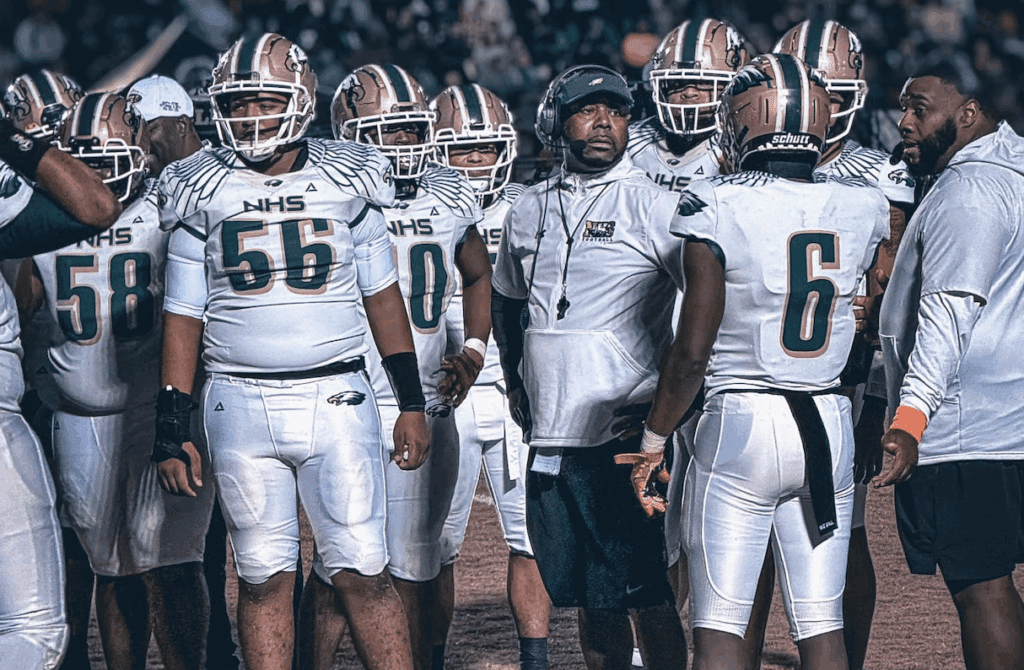
“This is my community. I graduated from Northeastern High School… I’ve spent all my life in this community,” Moore said. “This is one of the greatest communities you can be in.”
All FSCS’s in North Carolina have a community school coordinator, a school advisory board with funds, partnerships and programs, and a family resource center. There are 23 FSCS in 11 districts across the state.
A group called the North Carolina Community School’s Coalition is responsible for the implementation of the model, with a goal of improving the academic, mental, and physical health of North Carolina students.
Northeastern became a FSCS during the 2024-25 school year and they have seen notable growth during their first year as a community school. They moved from a D school to a C school over the last school year.
“It’s a game changer… We went from a borderline F school to five points away from a B,” Moore said.
More than a game
Increasing community involvement is in the ethos of the FSCS model. Before Northeastern became a FSCS, football was an effective driver of community engagement. Now, as a community school, they have a plethora of support to further engage the community, in addition to football, for the benefit of their students.
Moore knows the power of both community engagement and football well. He played football at Northeastern decades ago and then went on to play for Elizabeth City State University (ECSU). Growing up, he said football helped shape his character both on and off the field.
Moore was recently inducted into the hall of fame at his alma mater for football. Here are some of his accomplishments, according to ECSU’s website:
“Coach Moore attended Elizabeth City State University where he obtained a Bachelor of Science Degree in Criminal Justice/Minor in History. He also earned a master’s degree in Higher Education. During his time at ECSU he played football and held the position of linebacker. During his time there, 1994-1995 he was the defensive captain, 1994 honorable mention All-Conference, 1995 All-Conference linebacker, 1994 (6) sacks in a game against Virginia State (ECSU record), and 1995, most consistent defensive player award.”
After he graduated college, Moore took a job in the prison system where he helped connect incarcerated people to work. He also coached football on the side. His job in the prison system solidified his desire to positively impact people’s lives. He left his job to teach history and became the assistant football coach at Northeastern.
That was 27 years ago.
For nearly three decades, Moore has utilized his passion for making a positive impact to teach and coach thousands of students.
“That’s my calling,” Moore said. “Now I’m coaching and teaching my players’ kids and grandkids.”
Coach Moore asked a few of the students in his football program what football means to them. Here’s what they said.
“Football means everything to me,” said senior wide receiver Uzziah Harney. Growing up, Harney’s entire family used Saturday and Sunday football games as a way to bond. He started playing football at a young age, participating in youth leagues and middle school football before attending Northeastern High School. For him, “football isn’t just a sport — it’s a way of life.”
“It’s really powerful — football being more than just a game but a real source of motivation and support,” said junior Mekkhei Williams. Playing for Northeastern High School gives him purpose and keeps him on track both in the classroom and on the field, Coach Moore said.
Football is also more than just a game to Moore. To him, the sport creates a culture that spreads beyond the locker room and field. He’s seen it in his players and he’s experienced it himself — football can bring the excitement that makes a kid want to go to school.
“It really starts the year off and boosts the morale of your whole school,” Moore said.
Helping families helps students
The support that becoming a FSCS has given Northeastern has been transformative, according to Moore. Having a fully stocked resource center, having the capacity to sit with students and help them work through their daily challenges, and hosting community events are all ways being a FSCS has benefitted the high schoolers.
“We meet them where they are,” Moore said. “If a family needs something, I can really help them.”
The resource center at Northeastern is a hub for student needs. The room is stocked with snacks, clothes, personal hygiene products, and household cleaning products. Moore manages the center and is in frequent communication with school staff.
If a teacher notices a student is distracted, they might send that student to the resource center to have a snack. Moore shared that often once the student has a break and some food they are then able to go back to class and focus.
Research has shown that having increased access to food at school can:
- Improve academic achievement, standardized test scores, and cognitive function;
- Improve attendance, which is positively linked to academic achievement; and
- Reduce food insecurity, which is linked to poor academic outcomes.
A benefit of having students come by the resource center one-by-one during the school day also allows them to have some anonymity. This can reduce the stigma of needing those resources, according to Moore.
“If a kid is having a bad day, they come sit down with me… we work it out and talk it through,” Moore said.
Northeastern had several events during its first year as a FSCS that benefitted parents in addition to students, including listen and learn sessions across Elizabeth City, a business expo for students and parents, and more.
The business expo was a largely attended event. Overall, more than 500 people showed up with more than 300 of those being parents and more than 200 of those being students. Moore reached out to about 50 plus businesses in town for the event. At the expo, they gave out over $3,000 worth of gift cards. A total of 17 parents gained employment from the expo and 10 students also got jobs.
Moore is looking forward to repeating several of the successful events from last year throughout this school year, with new events coming as well.
“We’re fortunate to be a community school,” Moore said. “It’s really helping our school. It’s helping our parents and our kids.”
Recommended reading
